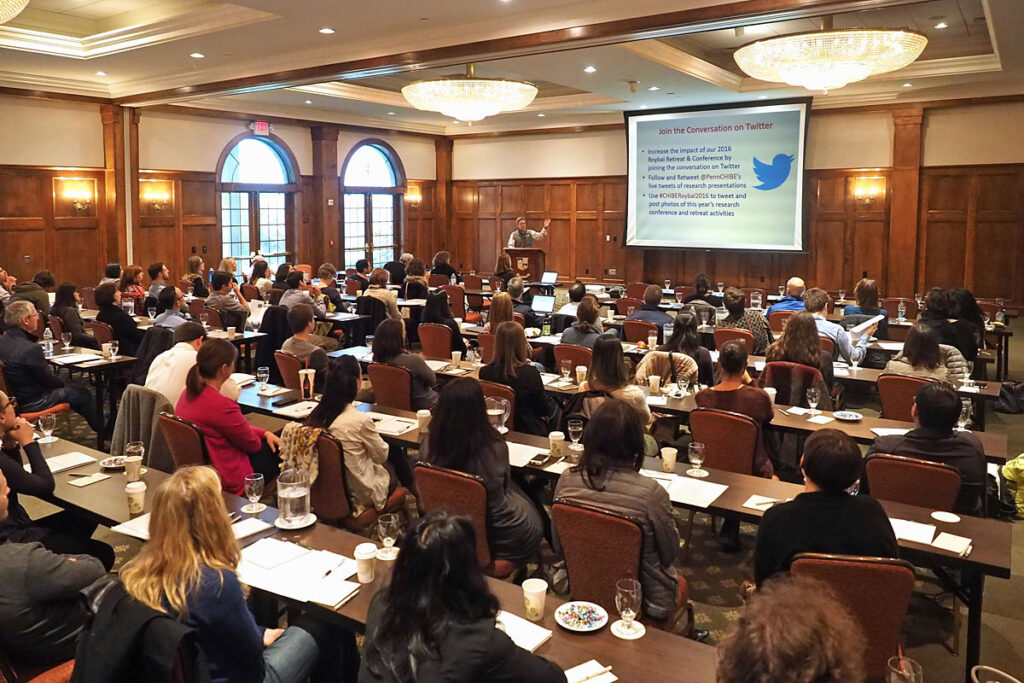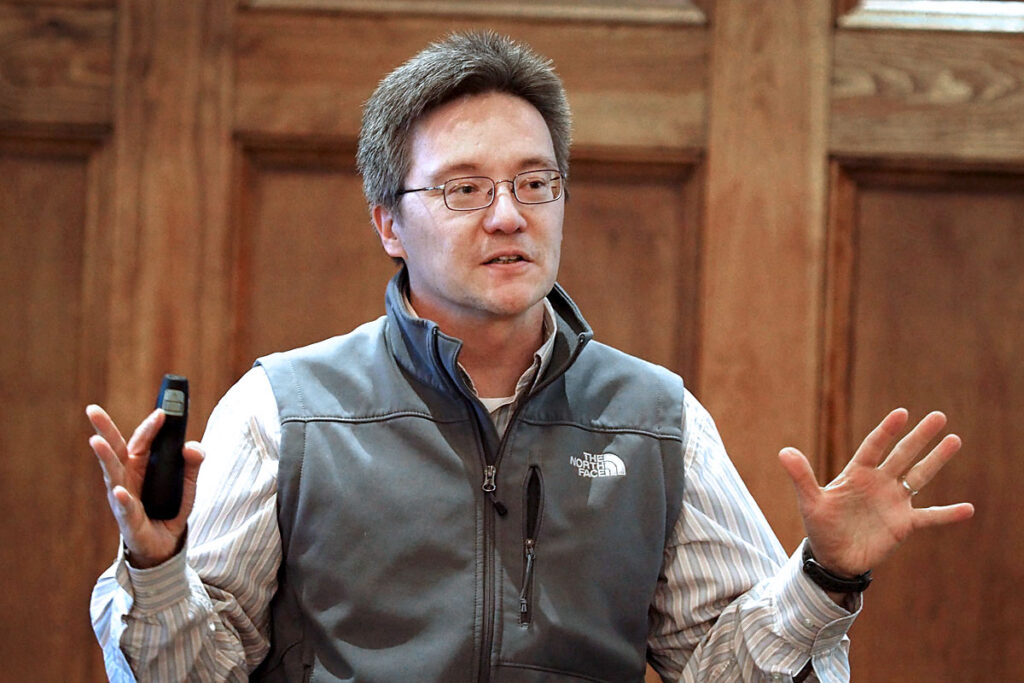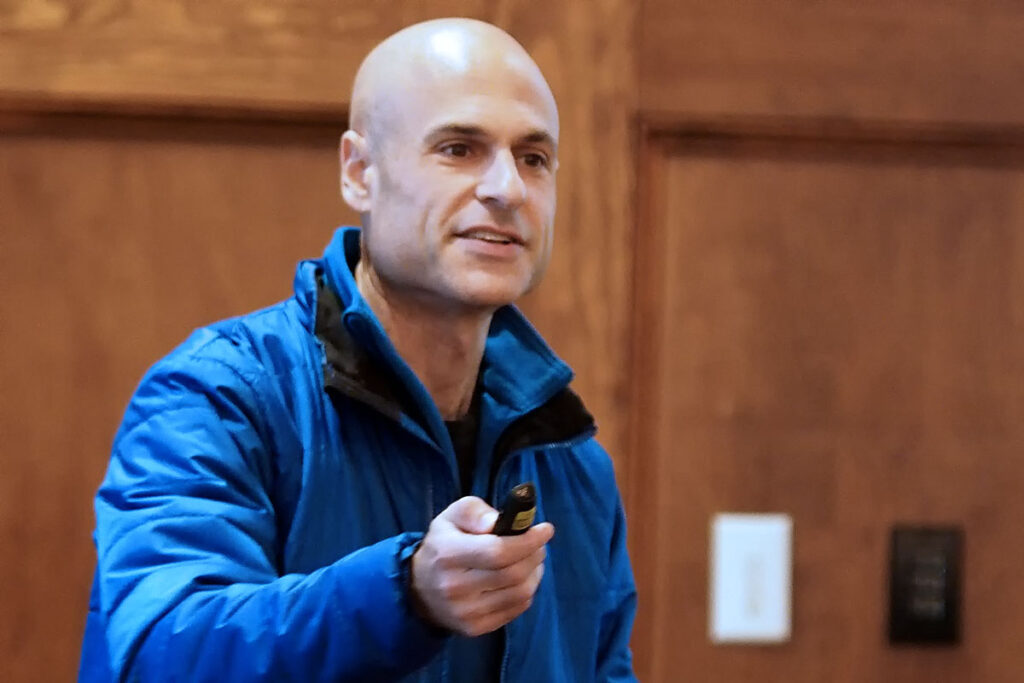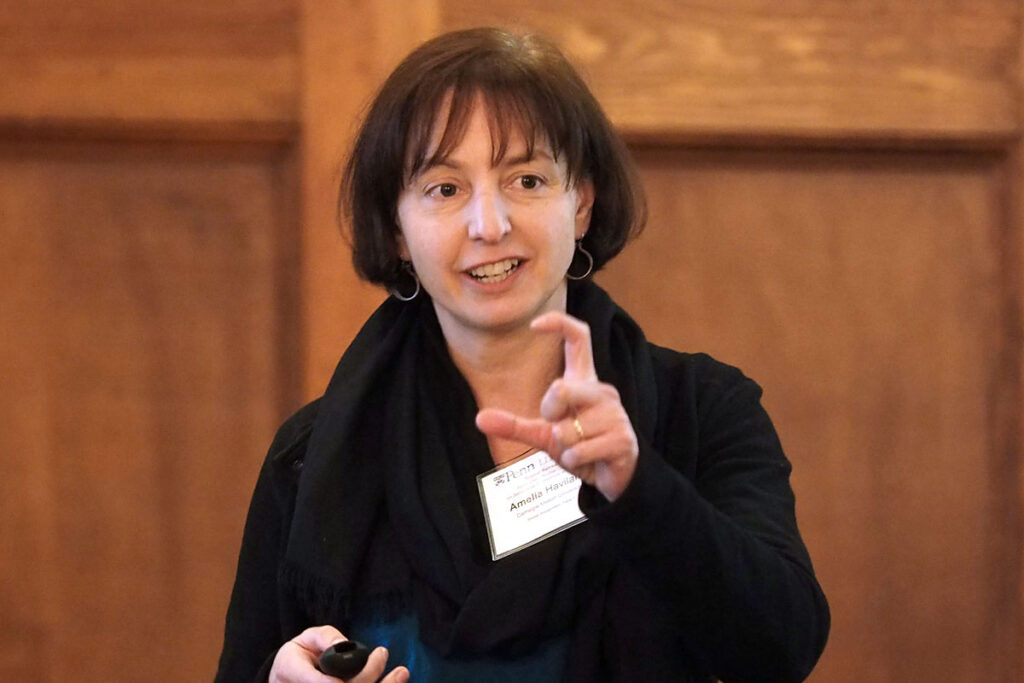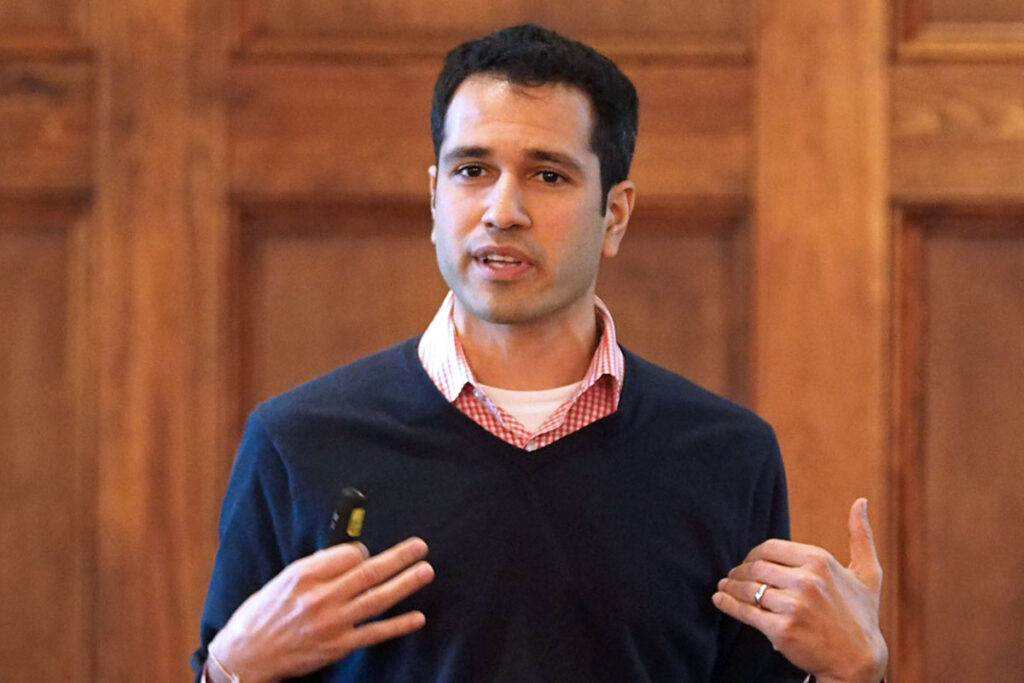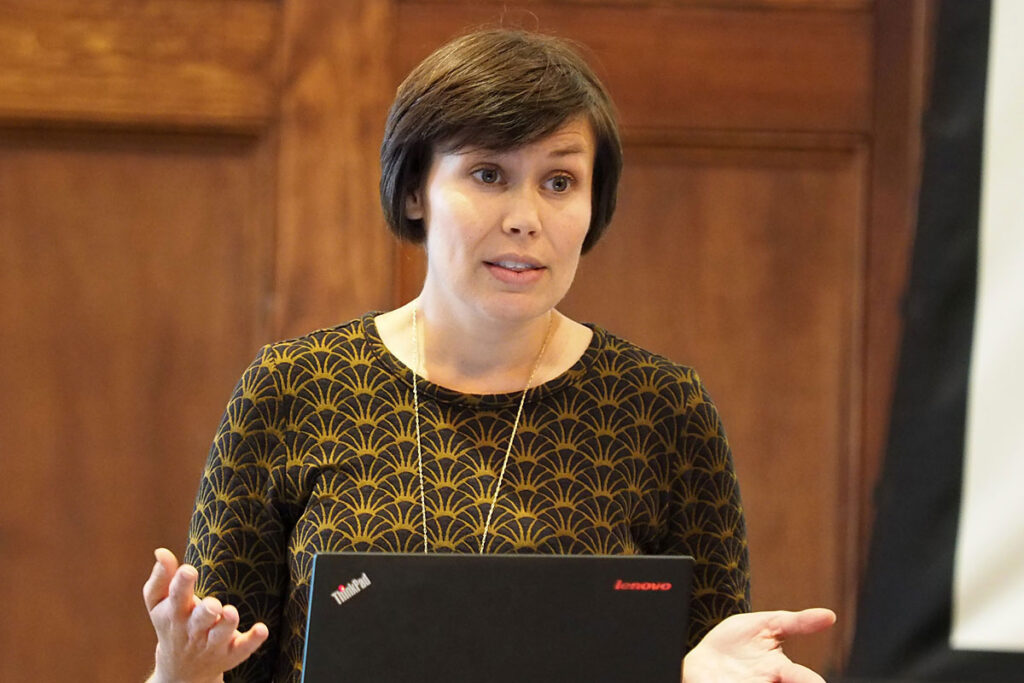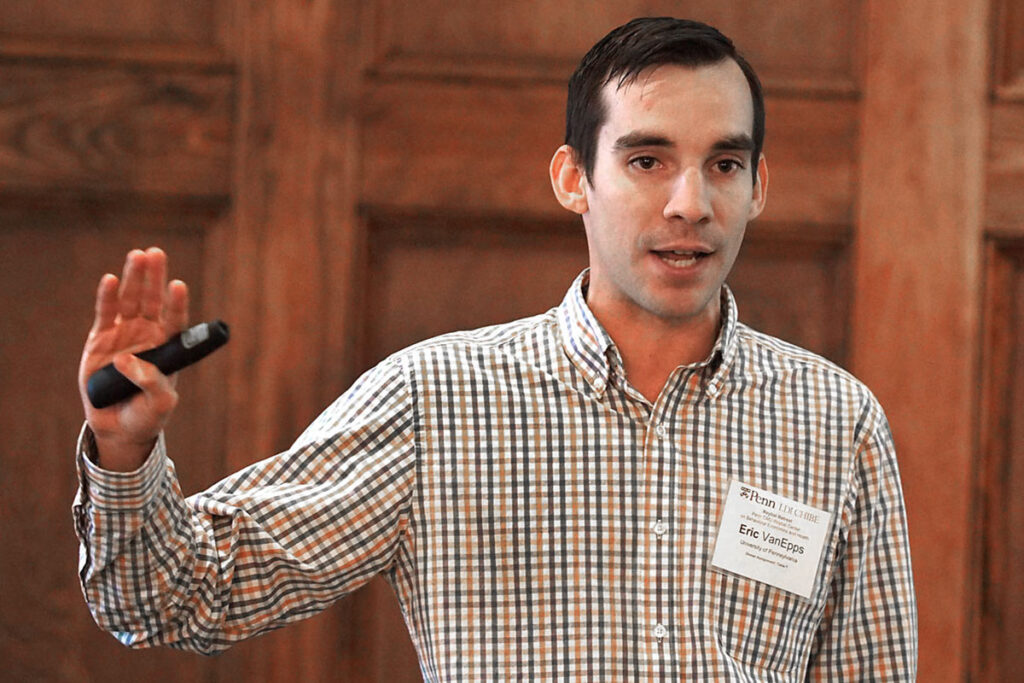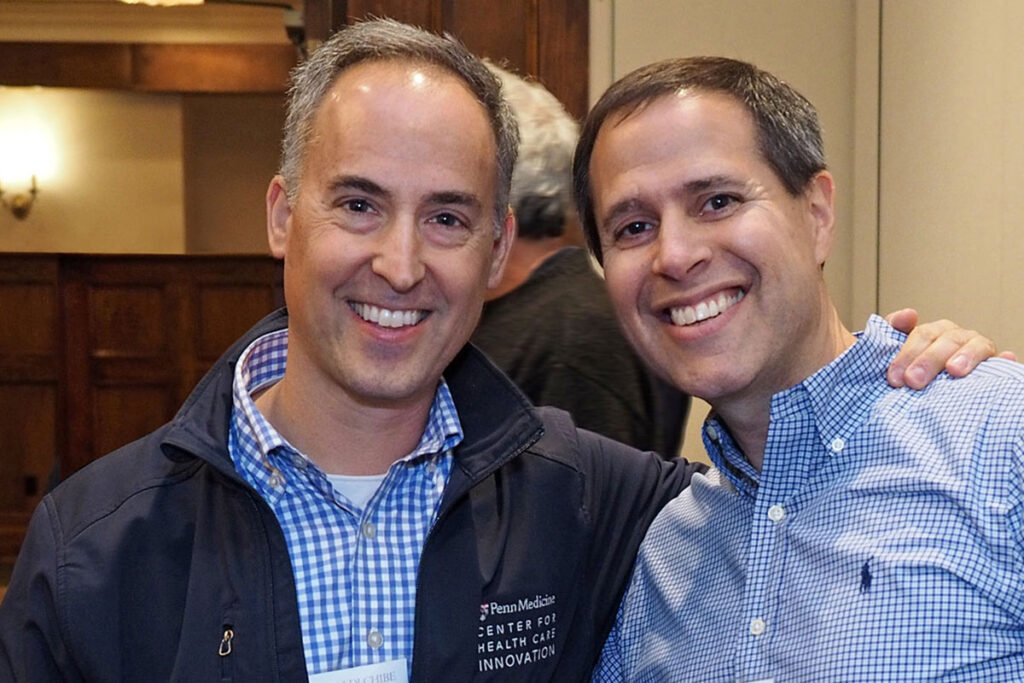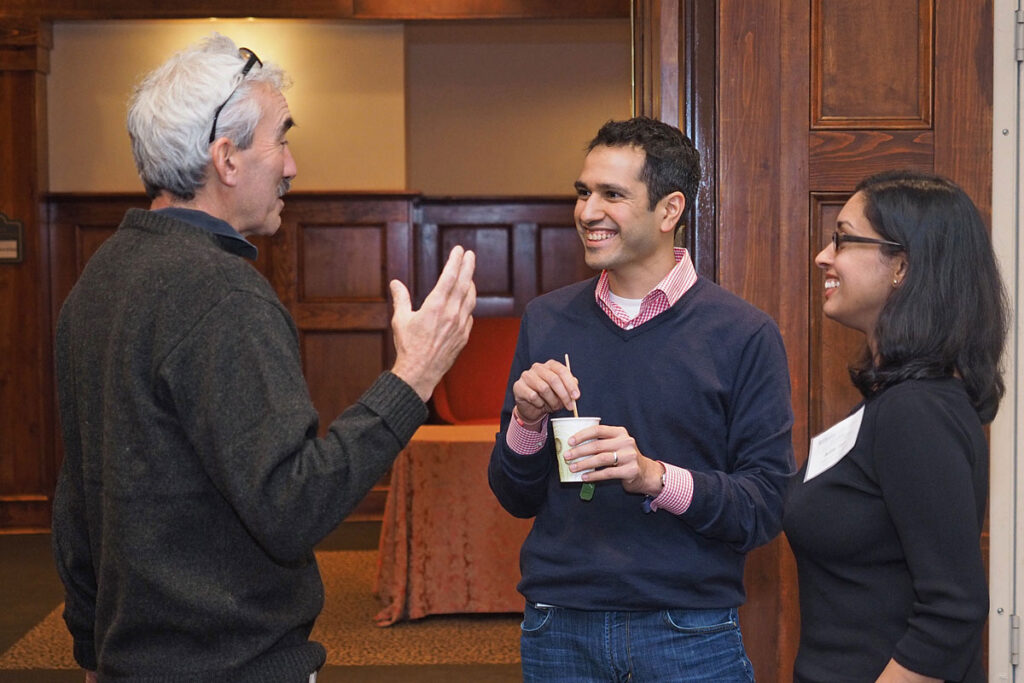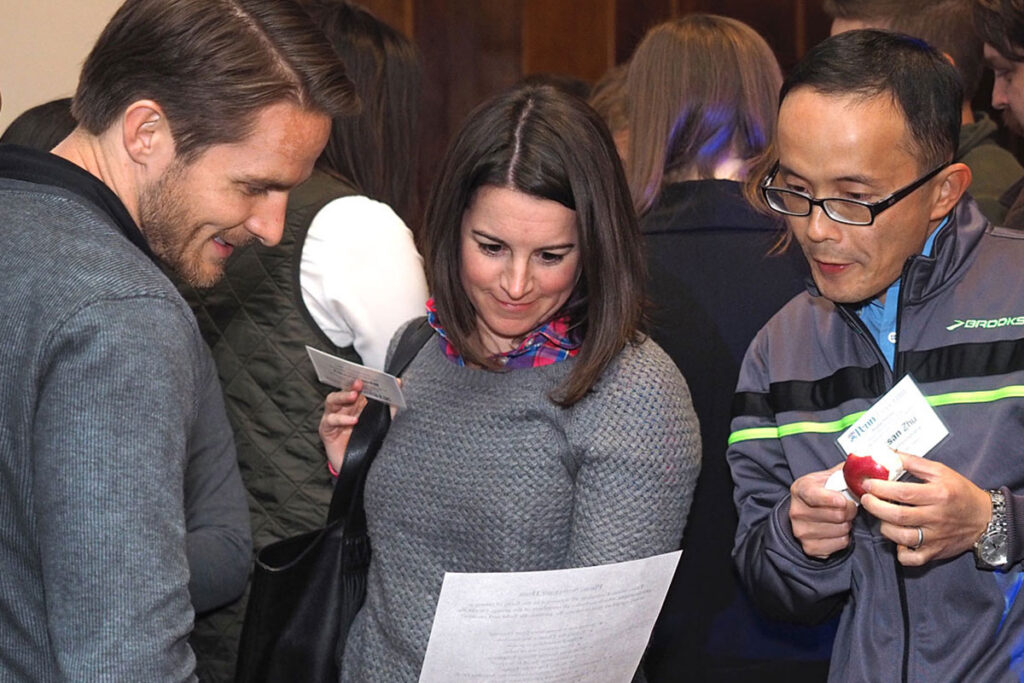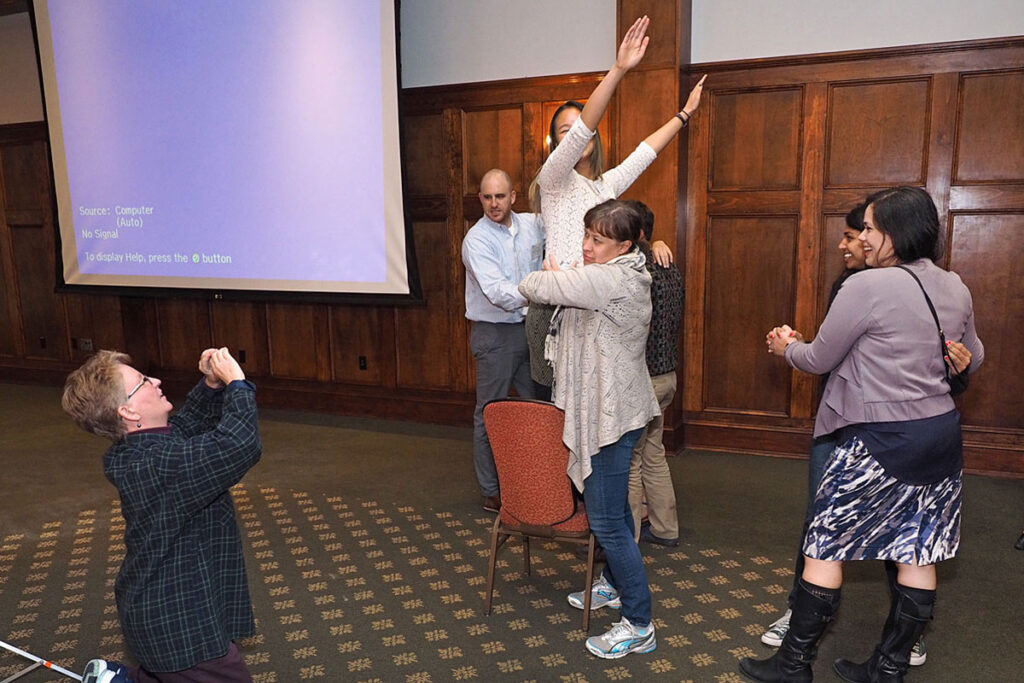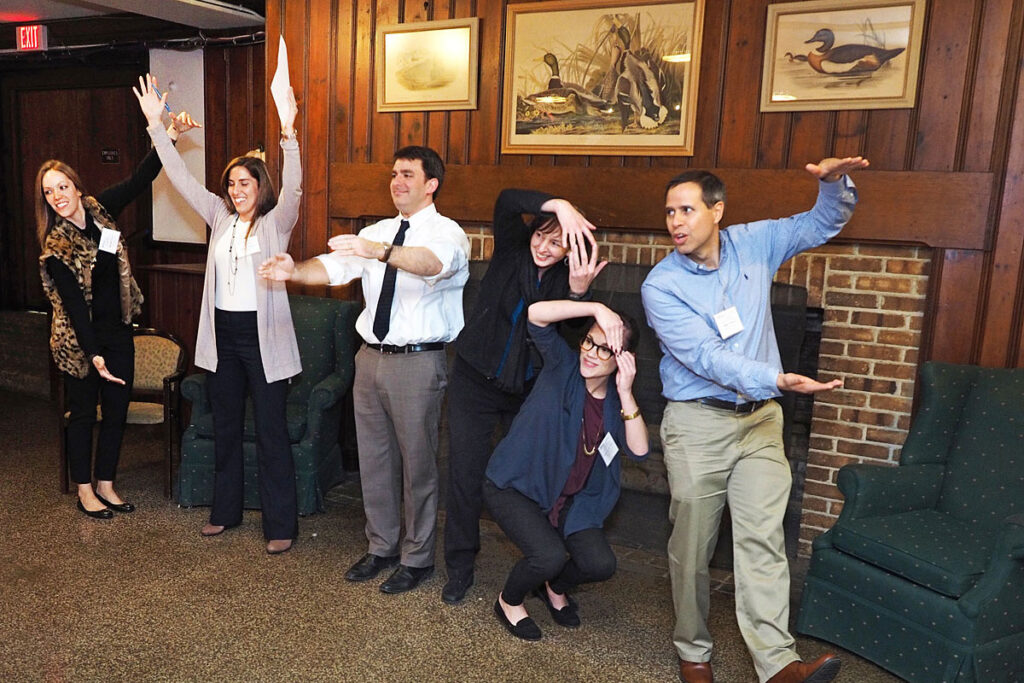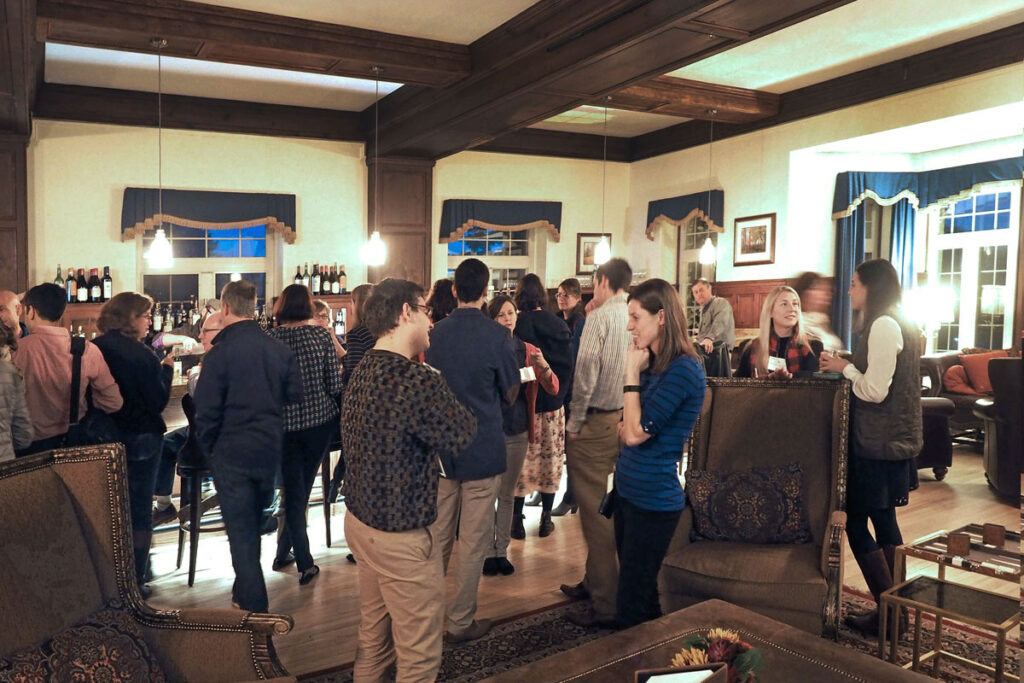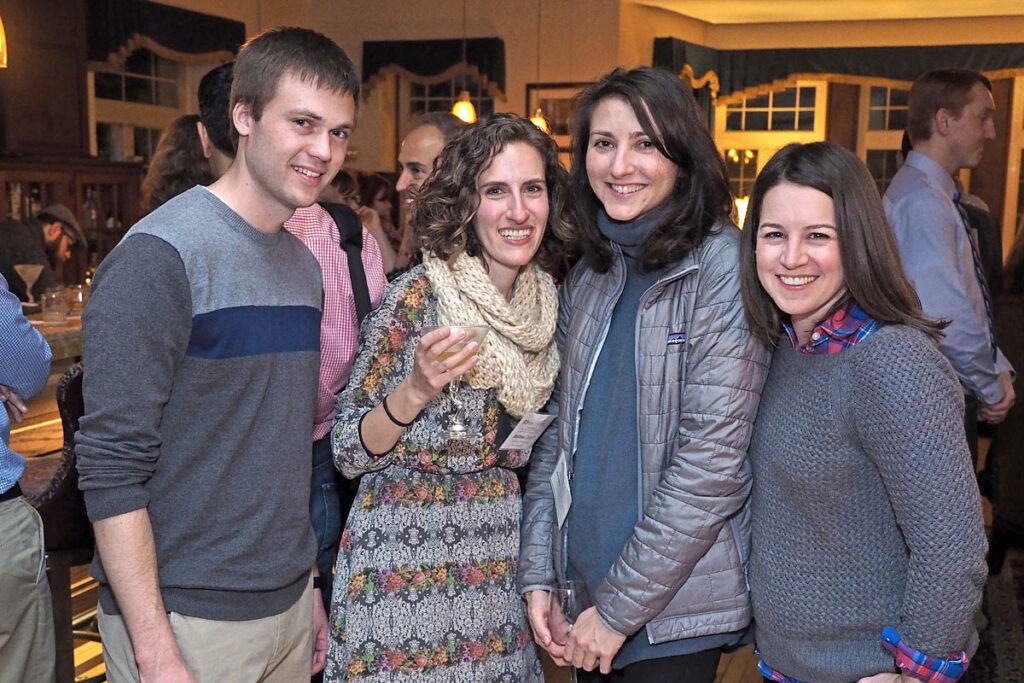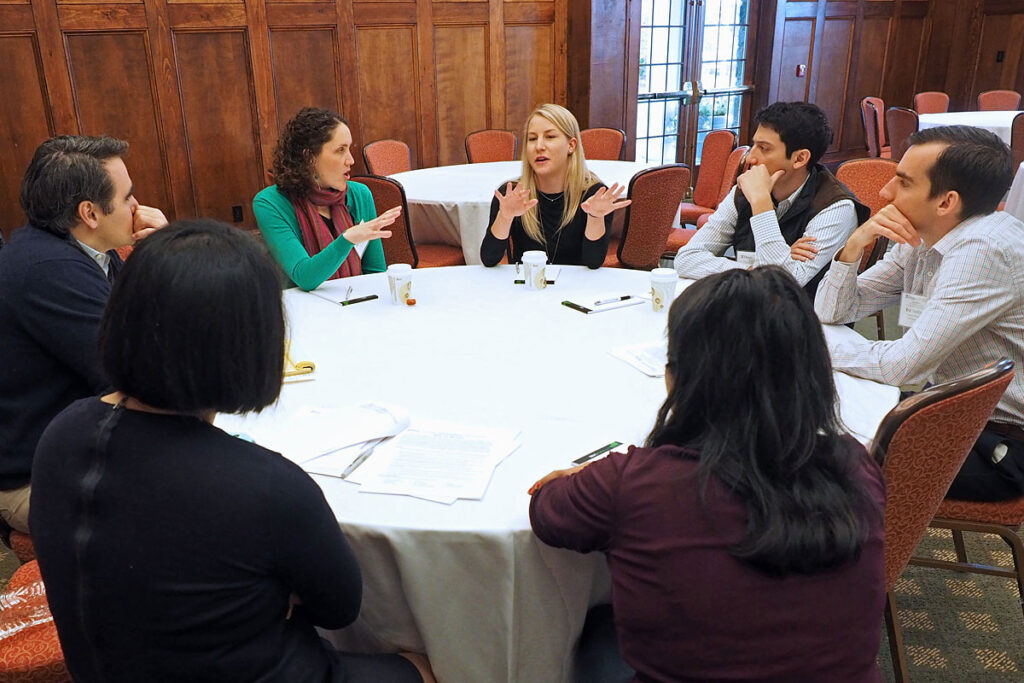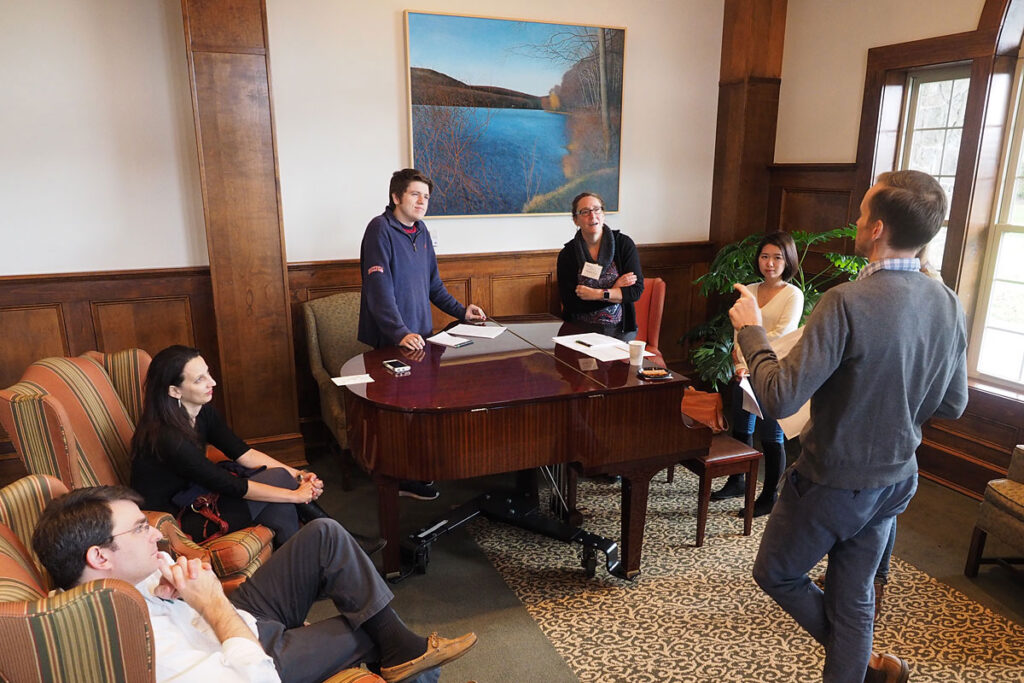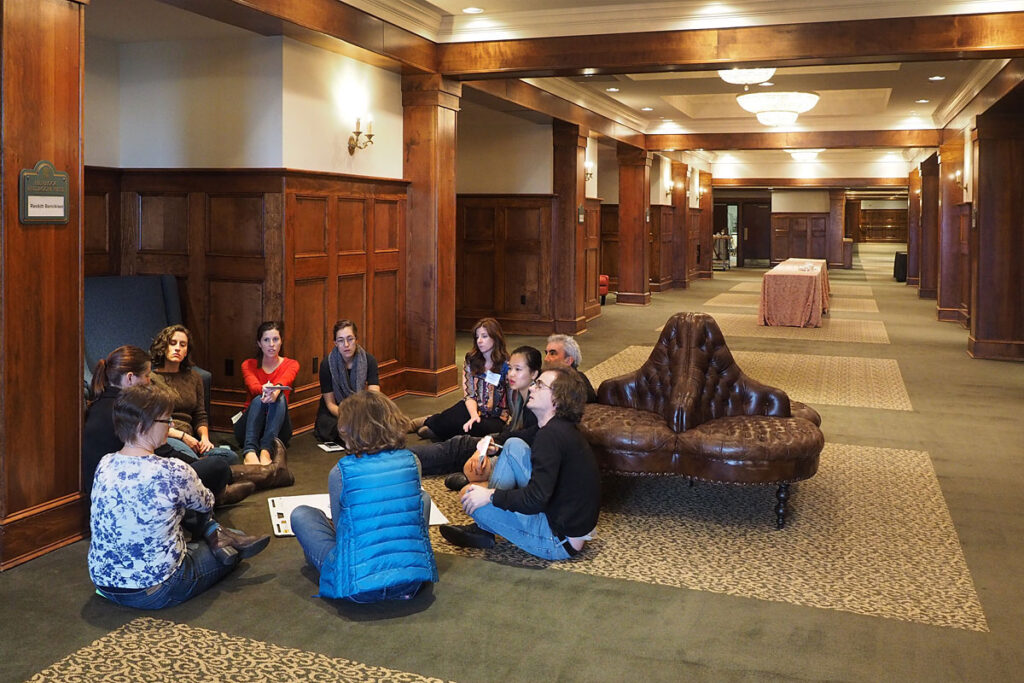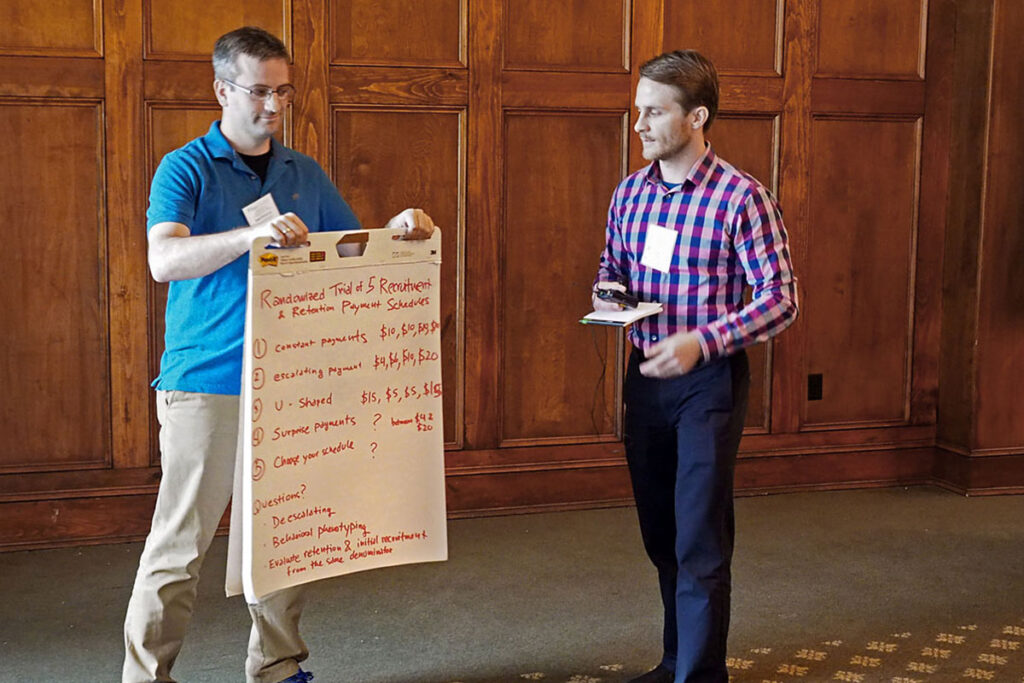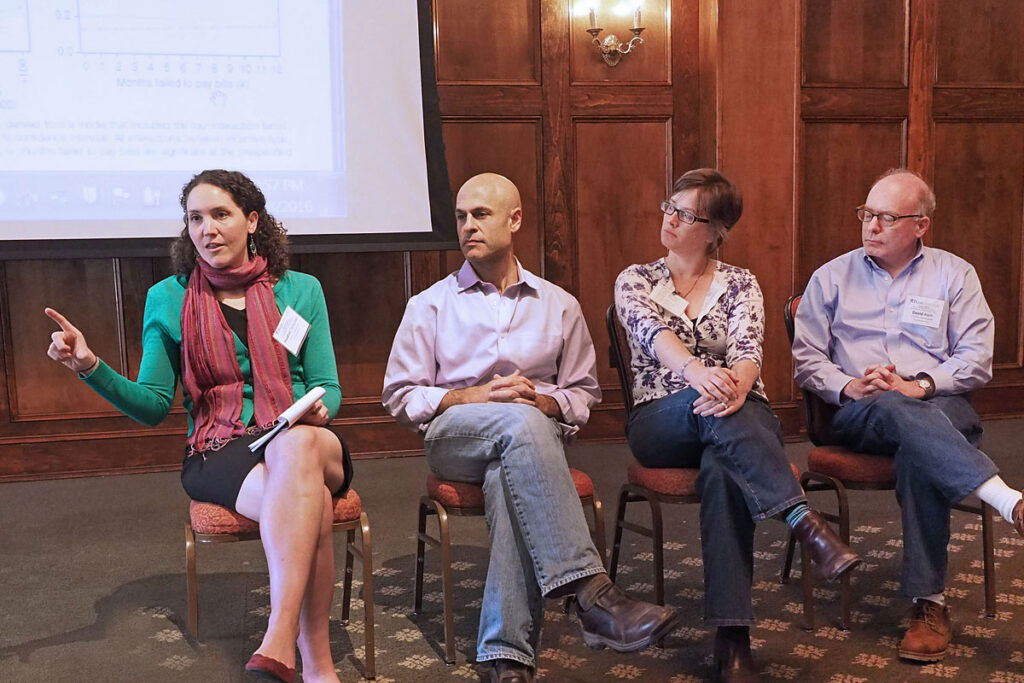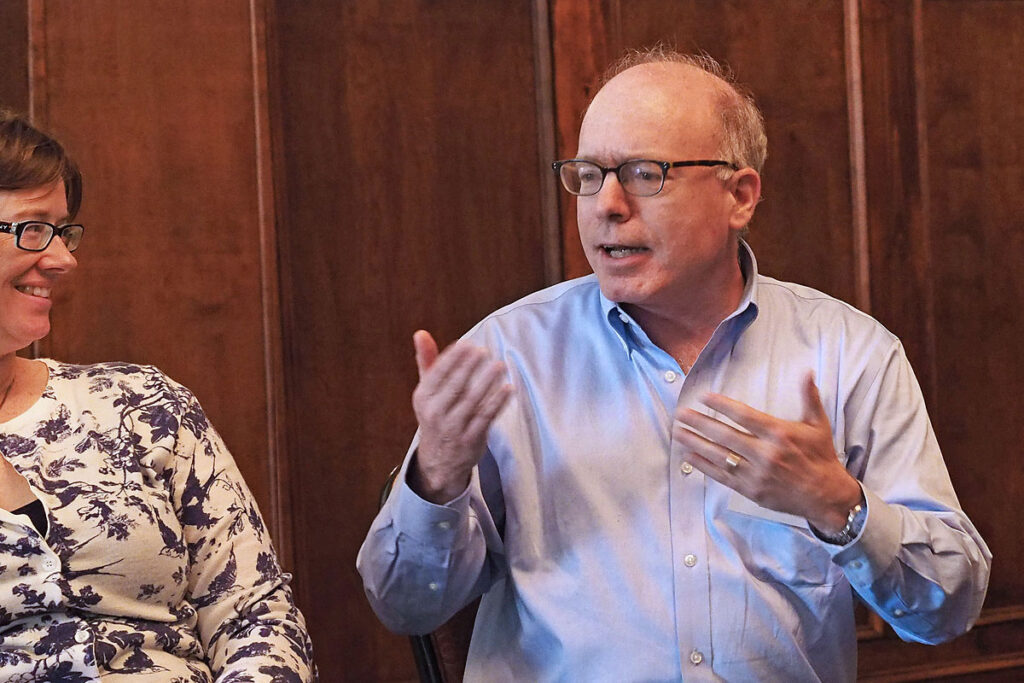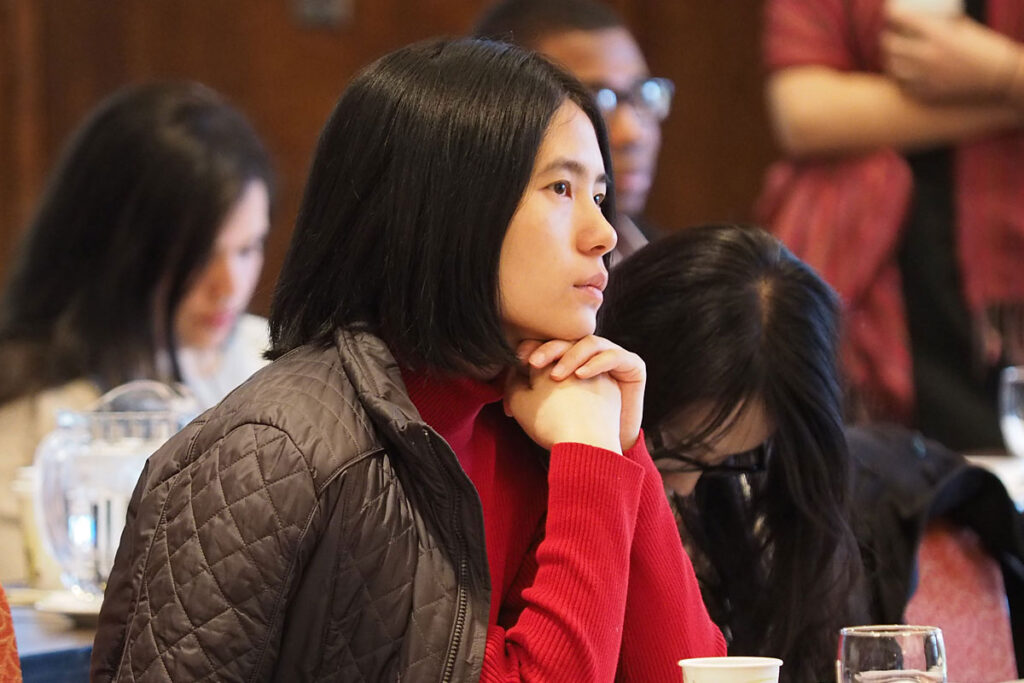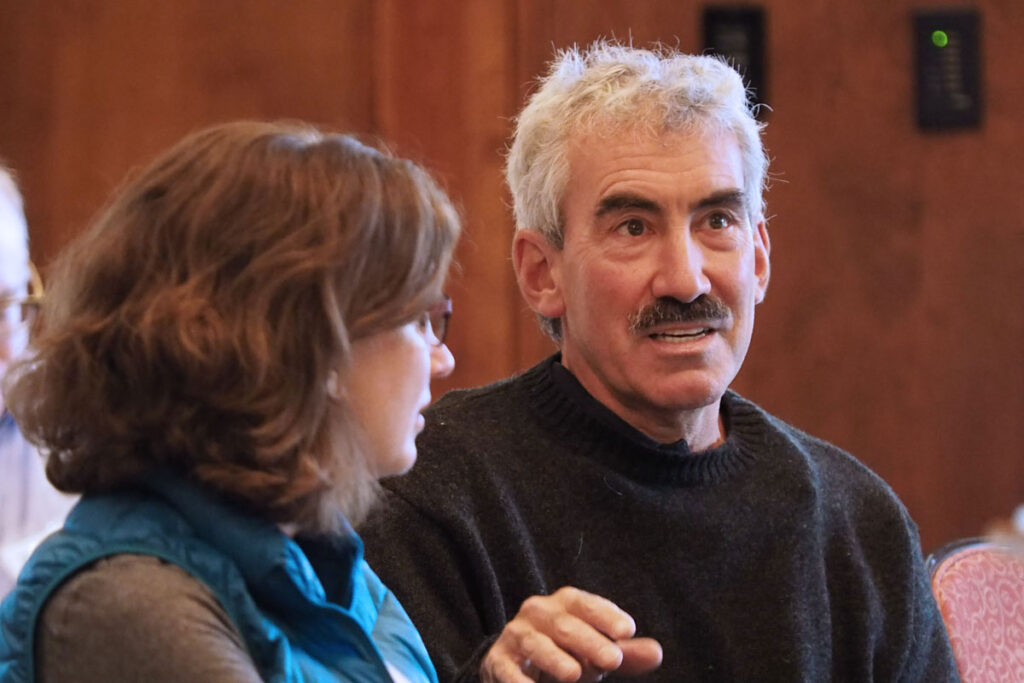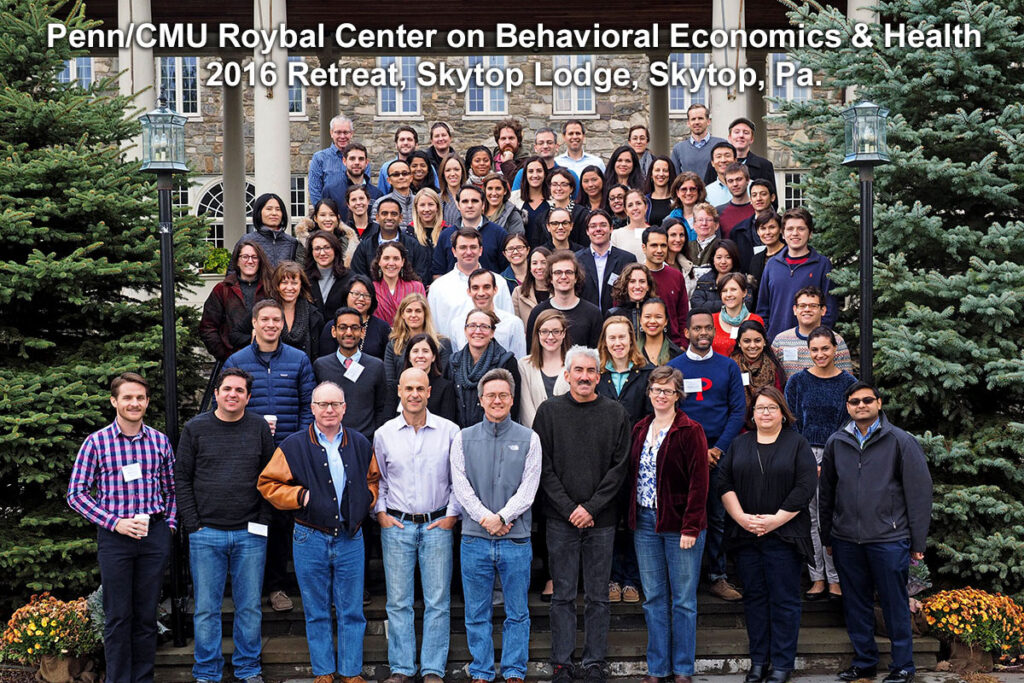News
Report from 2016 Penn/CMU Roybal Behavioral Economics Retreat
Largest-Ever Roybal Gathering Convenes at Skytop in The Poconos

SKYTOP, PA — Mountain vistas of fall foliage slicked in freezing rain were the visual order of the day as the University of Pennsylvania/Carnegie Mellon University Roybal Behavioral Economics Retreat convened at Skytop Lodge and Conference Center in the Poconos. It was the ninth and largest-ever retreat of scientists from the two university organizations that collaborate in the ongoing NIH P30 Center of Excellence Roybal research program: the Center for Health Incentives and Behavioral Economics (CHIBE) at the Leonard Davis Institute (LDI), and CMU’s Center for Behavioral and Decision Research (CBDR). Also attending were affiliated scientists from Harvard, Johns Hopkins, Duke, NYU, Fordham, Rutgers and Case Western.
Opening the two-day conference in Skytop’s East Evergreen Ballroom (above, left), Director of LDI CHIBE Kevin Volpp, MD, PhD (above, right), urged the audience to contribute to the event’s Twitter coverage. Volpp also announced a number of new CHIBE research projects. One is the creation of the world’s first clinically-oriented health system “nudge” unit headed by LDI Senior Fellow Mitesh Patel, MD, MBA, an Assistant Professor at Penn’s Perelman School of Medicine. Another is an expansion of CHIBE’s “Way to Health” automated clinical trial management system with an eye to making it free for research trainees over the next few years. A third, headed by Penn emergency physician and LDI Senior Fellow Kit Delgado, MD, MS, is exploring ways to use smartphone-connected breathalyzers in a program aimed at reducing risky drinking behaviors among college students.
LDI Senior Fellow and CHIBE Deputy Director Scott Halpern, MD, PhD (above, left), noted that the event, which fosters interdisciplinary research among behavioral scientists, had drawn a record attendance. He reviewed the past year’s most noteworthy research, commentary papers and awards among CHIBE-affiliated researchers. Halpern opened the first of retreat’s three sessions in which 18 health economists presented their most recent research. Amelia Haviland, PhD (above, right), of Carnegie Mellon’s Center for Behavioral and Decision Research (CBDR) spoke on her study of how to actively “nudge” consumers toward ACA exchange health plans more appropriate to their situation.
Physicians’ uptake of 15-year-old evidence-based practices known to reduce the mortality rate among acute respiratory distress syndrome patients in intensive care units has been slow, said LDI Senior Fellow Meeta Prasad Kerlin, MD, MSCE (above, left). She discussed her ideas for a study of how to improve this ICU dilemma. Above, right, LDI Senior Fellow and Director of Operations at the Penn Medicine Center for Health Care Innovation Shivan Mehta, MD, MBA, spoke on behavioral economic approaches to increase colorectal cancer screening.
The research of LDI Fellow and Penn Medicine pulmonary and critical care physician Joanna Hart, MD (above, left), is focused on the logistics, outcomes and end-of-life treatment practices of ICUs. A member of CHIBE’s FIELDS End-of-Life Decision Science Center, she noted the wide variation in end-of-life practices and discussed her exploration of how individual clinicians may contribute to this culture of variation. Above, right, CHIBE Postdoctoral Research Fellow Eric VanEpps, PhD, discussed his work in studies of commitment devices and practices in relation to weight loss and healthy eating campaigns.
Networking between sessions are Penn colleagues (above, left) Roy Rosin, MBA, the Chief Innovation Officer of the Penn Medicine Center for Health Care Innovation and Daniel Polsky, PhD, the Executive Director of Penn’s Leonard Davis Institute of Health Economics (LDI). Above, right, CMU CBDR Director George Loewenstein, PhD, chats with Penn Medicine’s Shivan Mehta, MD, MBA, and Johns Hopkins’ Aditi Sen, PhD.
Driven indoors by the bad weather, the Roybal Retreat’s competitive “team activity” became a photo scavenger hunt requiring each of ten teams to recreate certain scenarios. Perusing the list of 17 challenging scenarios (above, left) are Nik Gurney, MA, CMU PhD student, Elizabeth Cooney, MPH, Assistant Director of the FIELDS Program and Jingsan Zhu, MS, MBA, CHIBE Assistant Director of Data and Analytics. Above, right, working on the “Act Out a Scene From Dirty Dancing” scenario and doing their best to be Jennifer Grey and Patrick Swayze in the movie’s famed climatic dancing “lift” scene are Sophia Hua as Grey and Laurie Norton as Swayze. Manning the smartphone camera is Nancy Kennedy-Smith. Hua, MPH, is Manager of the Perelman School of Medicine’s Psychology of Eating and Consumer Health (PEACH) Lab; Nortan, MA, is a CHIBE Project Director; and Kennedy-Smith is the CHIBE Business Manager.
Above, left, responding to the required “Spell something in people” scenario, team number 3 spells out “CHIBE”. Members are (l to r) Devon Taylor, MPH, Operations Coordinator, CHIBE Way to Health System; Darra Finnerty, BS, CHIBE Clinical Research Coordinator; George Anesi, MD, MBE, Postdoctoral Fellow, Critical Care and Health Policy Research, Perelman School of Medicine; Amelia Haviland, PhD, CMU CBDR; Lynn Conell Price, PhD candidate, CMU Dietrich College of Social and Decision Sciences; and Daniel Polsky, PhD, LDI Executive Director. Team 3 was one of the contest’s two winning teams. Above, right, in response to the “Relive your childhood” scenario, this teams leaps on the motorcycle arcade game units. Members are (l t r) Mitesh Patel, MD, MBA, Assistant Professor of Medicine, Perelman School of Medicine; Jingsan Zhu, MS, MBA, CHIBE Assistant Director of Data and Analytics; Tori Ulrich, MPH, a CHIBE Clinical Research Coordinator; Scott Halpern, MD, PhD, CHIBE Deputy Director; Christina Jameson, Innovation Assistant, Penn Medicine Center for Health Care Innovation; and Nik Gurney, MA, CMU PhD student.
The reception ultimately overflowed into the bar (above, left). Enjoying the evening (above, right) are Brian Bayes, BSc, Data Manager, CHIBE FIELDS program; Melissa Ostroff, CHIBE Communications Manager; Jacqueline McMahon, MSW, Research Project Manager, FIELDS program; and Elizabeth Cooney, MPH, Assistant Director of the FIELDS Program.
An afternoon brainstorming session split attendees into ten teams, each working up concepts for one of three Penn Roybal Center behavioral economics health pilot projects. Above, left, in a conference room, LDI Senior Fellow Heather Schofield, PhD (green sweater) and Christina Jameson, Innovation Assistant, Penn Medicine Center for Health Care Innovation, debate a point. Another team ensconced itself in a piano alcove (above, right). There, LDI Senior Fellow Chen Kenyon, MD, MSHP, Penn Assistant Professor of Pediatrics (gray sweater) pitches an idea to members (l to r) George Anesi, MD, MBE, Postdoctoral Fellow, Perelman School of Medicine; Vanessa Madden, , BSc Hons, Project Manager, FIELDS program; Alexander Morris, BS, Clinical Research Coordinator at the Perelman School of Medicine; Pamela Shaw, PhD, Penn Associate Professor of Biostatistics; and Erin Huang, a CHIBE Data Analyst.
Sprawled in a conference corridor area (above, left) is yet another brainstorming group led by CMU CBDR Director George Loewenstein, PhD. In the end, all groups came together to hear synopses of pilot project ideas. Above, right in their presentation are LDI and Perelman School of Medicine Fellow Gary Weissman, MD, and Nik Gurney, MA, CMU PhD student.
Another session (above, left) featured a panel discussion of “behavioral phenotyping”: (l to r) LDI Senior Fellow Heather Schofield, PhD; LDI Senior Fellow Scott Halpern, MD, PhD; LDI Senior Fellow Alison Buttenheim, PhD, MBA, Penn Nursing School Assistant Professor; and LDI Senior Fellow David Asch, MD, MBA, Executive Director of the Penn Medicine Center for Health Care Innovation. Above right, David Asch discusses how the phenotyping concept is very new and not well defined as a potential way to determine which behavioral interventions are likely to work best with individual people.
Listening to the behavioral phenotyping panel are (above, left) Wenjun Zhong, PhD, MSc, CHIBE Staff Statistician. Above, right, CMU CBDR Director George Loewenstein, PhD, asks the panel a question.
